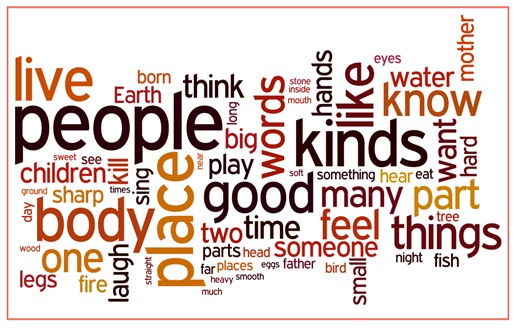Featuring an impressive range of speakers from multiple countries and disciplines, "Global English, Minimal English" aims to bring new energy and new ideas to interdisciplinary dialogue on two pressing issues: reducing the dangers of Anglocentrism and achieving better intercultural understanding in these times of Global English.
Download the Symposium Program
Download the Symposium Position Papers
As there is no charge for this Symposium Registration is essential.
Contact
Convenor: Anna Wierzbicka
Email: anna.wierzbicka@anu.edu.au
Convenor: Zhengdao Ye
Email: Zhengdao.Ye@anu.edu.au
Convenor: Cliff Goddard
Email: c.goddard@griffith.edu.au
Program
Thursday, July 2, 2015
Morning session
| 8.30–9.00am | Warm-up over coffee |
| 9.00–9.15am | Professor Cliff Goddard (Griffith University), Professor Paul Pickering, (Director of the Research School of Humanities and the Arts, and Interim Dean, CASS) and Professor William Christie (Director HRC) Welcome |
| 9.15-9.30am | Professor Anna Wierzbicka (ANU) |
| 9.30-10.00am | Professor Cliff Goddard (Griffith University): Minimal English: The science behind it |
| 10.00-10.30am | Dr Anna Gladkova (University of New England) Global English, Minimal English: A view from Russia |
| 10.30-11.00am | Dr Annabelle Mooney (Roehampton University, UK): Torture laid bare: Global English and Human Rights |
| 11.00–11.30am | Coffee Break |
| 11.30am–12pm | Respondent: Professor William Maley (Professor of Diplomacy, Asia-Pacific College of Diplomacy, ANU) |
| 12.00–12.30pm | General Discussion |
| 12.30-2.00pm | Lunch |
Afternoon session
| 2.00-2.30pm | Professor Anna Wierzbicka (ANU) A Charter of Global Ethics in Minimal English |
| 2.30-3.00pm | A/Professor Bert Peeters (Griffith University): Empirical evidence: Neither évident nor empirique? |
| 3.00-3.30pm | Professor Felix Ameka (Leiden University, Netherlands) Can Minimal English bridge the gap between African Englishes and Global English? |
| 3.30-4.00pm | Coffee Break |
| 4.00-4.30pm | Respondent: Professor Catherine Travis (Professor of European Languages, ANU) |
| 4.30–5.00pm | Professor David Christian (Macquarie University, Professor of History and President of the International Big History Association) Minimal English and the Big History Project |
| 5.00-5:30pm | General Discussion |
Friday, July 3, 2015
Morning session
| 9.00–9.30am | Dr Carsten Levisen (Roskilde University, Denmark) Lanwis Ideologies: A perspective from Postcolonial Melanesia |
| 9.30-10.00am | Dr Sophie Nicholls (University of Western Sydney) |
| 10.00-10.30am | Professor Jakelin Troy ((Director , Aboriginal and Torres Strait Islander Research Centre, Sydney University) Aboriginal cultural concepts and the challenge of intercultural education: Can Minimal English help? |
| 10.30-11.00am | Respondent: Dr Deborah Hill (University of Canberra) |
| 11.00–11.30am | Coffee Break |
| 11.30am–12pm | Professor Michael Wesley (Director, Coral Bell School of Asia Pacific and Dr. Nicholas Farrelly (Fellow, Bell School of Asia Pacific Affairs, ANU) Internationalising Minimal English: Perils and parallels |
| 12.00–12.30pm | General Discussion |
| 12.30-2.00pm | Lunch |
Afternoon session
| 2.00-2.30pm | Dr Zhengdao Ye (ANU) Speech Events in International Affairs: Chinese duìhuà对话 vs. English ‘dialogue’, ‘talks’, ‘consultations’ |
| 2.30-3.00pm | Dr Jock Wong (National University of Singapore) Semantic challenges in the understanding of Global English: A perspective from Singapore |
| 3.00-3.30pm | Mr. Gian Marco Farese (ANU) Global English: A Perspective of an International Student in Australia |
| 3.30-4.00pm | Respondent: Professor Richard Rigby (Professorial Fellow, Crawford School of Public Policy, Executive Director, ANU China Institute) |
| 4.00-4.30pm | Coffee Break |
| 4.30–5.00pm | Professor Joseph Lo Bianco (Professor of Language and Literacy Education, University of Melbourne) Utility, Neutrality, Efficiency, and Open Doors: Problems with the claims for English in education in multiethnic societies |
| 5.00-5:30pm | General Discussion |
| 5.30-5.45pm | Professor Cliff Goddard Closing Remarks |

Location
Speakers
- See Program Information
Contact
- Prof Anna Wierzbicka